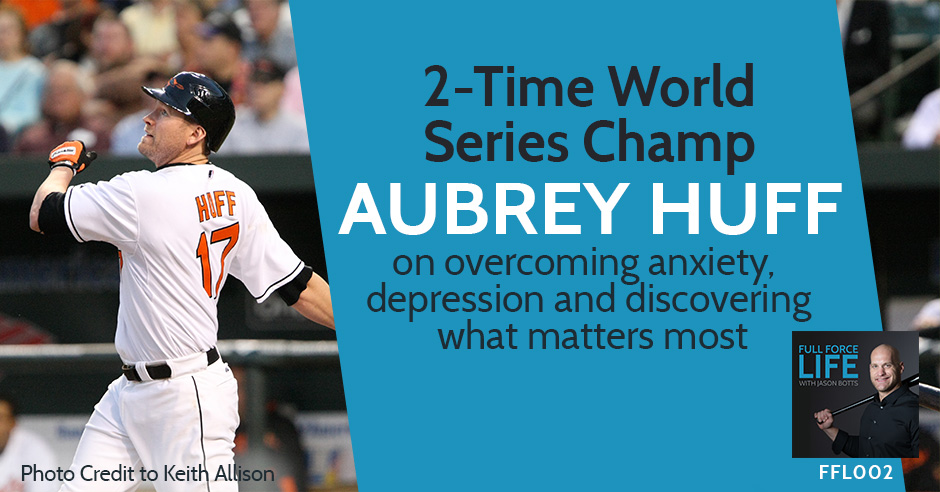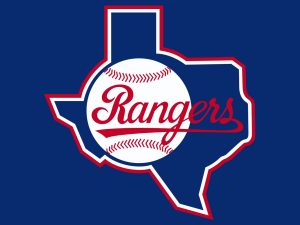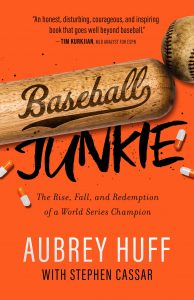
Welcome to this episode of Full Force Life. In this show, we have a very special guest. He’s a long time Major Leaguer, Aubrey Huff. He knows something about peak performance too, hitting 242 Major League home runs. In this show, I wanted to do something a little bit deeper. He just recently has authored and is launching a book called bas. He goes in depth about his struggles and his battles with anxiety and depression. With more than 40 million Americans going through it right now, I thought it was a very important show to do. I feel like it’s going to hit a lot of people close to home.
It’s my highest hopes, this was my vision for the show, was to have something to help people if they’re in that low place or to have some great advice from someone who’s been through it on how to help someone that you may know who might be going through it as well. It’s a long interview. I want you guys to go ahead and dive right on into it. Please pass this along, please share this with others. Hope you’d appreciate the value that’s in this episode.
Listen to the podcast here:
Aubrey Huff – Overcoming Anxiety and Depression
Hey, everybody. This is Jason Botts. Welcome to the Full Force Life. Today, we have a very special guest, a long time Major Leaguer, Aubrey Huff. Aubrey just recently written and is releasing a book called Baseball Junkie: The Rise, The Fall and The Redemption of a World Series Champion. It’s an absolute honor to have you on the show, Aubrey. Please feel welcome, my friend.
Thanks, Jason. It’s good to be on the show, bud.
One other thing I wanted to add in about you, apparently, I was looking over your website and I should’ve mentioned, kick ass artist. What you got working on here?
This is my Wonder Woman rendition. I had my wife as inspiration. This is her. I’m starting to work on that.
Amazing.
That’s my free therapy after baseball. That transition, you need something to go into after baseball. I didn’t have that for a couple of years. I got back to my doodles I did in high school. I really took to art. To me, it really calmed my brain and gave me something to do daily. I wake up, I take the kids to school. I just can’t wait to get to my office and start drawing and painting.
Was it something you did during your career at all or at a younger age or just really dived into it afterwards?
Interesting story, when I was around six years old, my father passed away. He was murdered in Abilene, Texas. I was left without a father. I spent a lot of my years over at my grandmother’s house. I started taking to painting, for whatever reason. I think my aunt was an artist, had a lot of paintings are up in my grandmother’s house. I just took to that, I started drawing things. I became a baseball fan through my grandmother who was a Texas Rangers baseball fan, interestingly enough. I started drawing a lot of Texas Rangers logos, Texas Rangers baseballs of flames coming around it. I painted this canvas of the Texas Rangers logo and I went to a Rangers game, first ever in the old Arlington Stadium when I was nine. I had thirteen guys right out of dugout sign that thing. It was then I knew I wanted to be a Major League Baseball player. Once I started baseball, you know as I do, you don’t have a whole heck of a lot of free time to dabble into too many hobbies. You’re worried about hitting 2-0 slider, you know what I mean?
Absolutely. That’s an awesome story. That was the moment then where you had those big league dreams.

It was interesting because after I left, nine years old, hopped in the car, heading back home with my mom. I asked my mom, I said, “Mom, will you please buy me a batting cage? I promise you one day, I’ll be a big leaguer and I’ll buy you a house and a car.” She goes, “That’s sweet, honey.” She’s a single mom working at Winn-Dixie, working at the meat department, couldn’t really afford it. I hounded her for a year over this. December 20th, she got me a batting cage when I was ten for my birthday and Christmas present. I’m hitting that thing Jason, every single day from I’d say four o’clock after school to about six, hitting about 200, 300 balls daily. I didn’t stop until I got out of high school. Interestingly enough, I was hitting in that cage every single day, picturing myself hitting a game winning World Series home run down the right field line in Arlington Stadium as a kid, every single pitch. In 2010, we’re playing the Rangers in game four of the World Series in Arlington. I stepped up to the plate as a San Francisco Giant and hit a game winning two-run homer in the fourth inning, right down the right field line, just like I had pictured my entire life. It was pretty surreal.
I’ve mentioned I wanted to talk you to pick your brain a little bit towards the end of the call about some of the peak performance types of ideas for young ball players. You touched on some important factors right there. What do you have to say about advice for kids today and just putting in the time? I was the same way, just an absolute cage rat. Today, kids play so many games and they don’t spend as much time practicing. Do you feel like that was a benefit or would you think you would’ve done better playing more games at that time?
I think for us, we were at a disadvantage because we didn’t have the technology kids have today, Jason. You hit on that a little bit. Kids today, all they want to do is play on iPad. You go to dinner, you see kids playing on iPads during dinner. Kids now have an advantage. I think if you’re a kid nowadays, if you want it, you have a distinct advantage right now because so many other kids are so distracted by other things out there that you go out there and you work your butt off and practice, practice, practice. That’s what it’s going to take. You can’t just practice and not love it. You can go out there and kind of want it, it’s not going to happen for you. You have to love it with all your heart.
I absolutely loved it, I couldn’t wait to get to my batting cage daily and do what I did. I tell kids this all the time, you hear parents say, “Son, you got to have a plan B for your life.” I can guarantee, that parent who says that to you is living their plan B. I never believed in a plan B. For me, it was plan A, plan A only, I was going to be a Major League Baseball player. Nobody’s going to tell me different. I had this delusional quality about me where even when I wasn’t successful in high school, I hit 300 in high school with a home run my senior year. I had to walk on to a junior college, that’s where I blossomed. I was a late bloomer. Even in high school, I was delusional in the sense that I knew I was going to make the Major Leagues when all of the stats suggested I wasn’t. You got to believe it, you got to love it and you got to eat, sleep and drink baseball every day.
I love it. I totally agree. The full commitment. It’s like what it takes to hit 100 mile an hour fastball. There’s no plan B when it comes to hitting that 100 mile an hour fastball. You need to sell the farm for it.
That’s right.
Talking about the book. We got the book. First, I just honor you for really the details you go into about depression and anxiety, both during your career and afterwards. I really applaud you for it. The courage and the vulnerability to share your story, really how did that come to be? As far as writing the book and having the courage to share your story, how’d that come to be and what was the purpose behind it all? What do you hope for it?

When I was a kid, I never really liked to read. I hated writing. It was interesting I wrote a book. I think the only book I ever read was in junior high. I read Where the Red Fern Grows. The dog dies at the end, I cried forever. I vowed to never read a book in my life. Transitioning out of baseball, as you know, it’s a tough deal. You’re so used to 40,000 people screaming your name every day, the travel, the guys, the camaraderie. All of a sudden when you retire, it stops like that. You’ll never make that kind of money again, you’ll never have that kind of camaraderie again, you’ll never have that adrenaline rush again. You’ve lived that dream and you’re 35 and it’s over. You have the rest of your life to live. What do you do with the rest of your life? We went to school for baseball really. I did, went to University of Miami. I didn’t really remember anything in college. I had no other skillset. I was left with, “What am I going to do with my life?” I went to a downward spiral, struggling with anxiety, depression.
At one point, in 2014, I had a gun to my temple in my closet, thinking about pulling the trigger. It was that low. I remember in that moment, being a kid from Texas, I’ve grown up in church. I was sitting there, staring at myself in this full-length mirror. My dad was murdered by the same exact .357 magnum, same caliber weapon that I’m holding to my head, thinking, “Life comes full circle.” It snapped me out of it. I was on my knees, I prayed to God, I needed answers. It was at that moment where I got back to my faith. I started going to church more, I started thinking more positively, first and foremost, I think that was one of the things. I was such a Negative Nancy ever since I retired. It just got to me.
I remember going to a men’s retreat. I watched this guy go up on stage and start talking about the struggles he’s went through his life, the anxiety, depression he was struggling with. I’m sitting in the back, I don’t know a single soul in this men’s retreat, listening to this guy, thinking what courage it must take for him to go up there. There’s no way I will ever be able to go up there and talk about something like this. It was in that moment where I got a rush. If you’ve ever felt that, I’m sure you have, hairs on your neck are next standing up. You just got this overwhelming feeling, like this thought just pumps into your mind. It was, “You got a hell of a story. You should write a book.”
At the time, I was still on my way out of the anxiety. I took that thought and I go, “Forget it. That’s just stupid. It was a onetime thing.” It wouldn’t stop nagging me. That thought kept coming to my head over and over and over. I decided I would reach out to somebody. I reached out to my buddy Stephen Cassar who’s right around here in San Diego. We got to work on a book. That was about a year and a half and here we are. It’s about ready to be launched out in February, spring training. The whole purpose of the book as we wrote it was to really encourage people that they’re not alone in their struggles with anxiety, depression, addiction, things of that nature. I’ve gone through a lot in my life. I had quite a story to share. If it can inspire somebody to help them through a tough time, then that’s what this book’s all about.
You mentioned about that moment in the closet with the .357 magnum and that idea of things coming full circle and the retreat. How long was the retreat afterwards? What was the process of you getting back on your feet again? It wasn’t an overnight thing, I imagine. What are the types of things that you focused on? Just in terms of a way to, if someone’s in that kind of moment right now, what of advice, what are the things that you did to help you get back on your feet?
I’m not anti-drugs, I’m not anti-depression medication. I took it for the longest time, I took Xanax for years for my anxiety. In that moment, when I exited that closet, it took me literally a couple of years to get to where my body leveled out again. Faith was number one for me. Every day, I was in the Word, praying, just getting my spirit filled. It’s mind, body and spirit. I got the spirit part down. I started having to think about my body. My wife’s a fitness competitor. She eats good, she works out every day. I leaned on her for inspiration. I started hitting the gym again, working out, that got endorphins flowing. That started helping me out to a point. I stopped really hitting the booze as hard as I was, that helped a lot.

Every single day, I’d wake up, like I said, get into the Word a little bit and then immediately after that, I would pop on a YouTube video, these motivational videos. You hear Tony Robbins speaking or Eric Thomas, ET, just these guys with the motivational music in the background. Dude, eventually, I started thinking positively, rewiring that brain for positivity. Jason, I got to tell you, after my retirement, for whatever reason, every single day, my wife, if she would take my kids to go get ice cream or something, I would think that she’d go get raped and my kids would be kidnapped. Just unrealized fears and stupid thoughts I would have. I don’t know where they came from or why they did but I had to stop doing that. The minute I realized that was my problem, everything started to get better.
Time wise, how long do you think the journey was before you really felt solid and balanced out and who you were and where you wanted to go?
A lot of people aren’t going to want to hear this because in this world we live in everybody’s looking for the quick fix. It took me a couple of years. Honestly, today, I’m not going to lie to you, I have my bad days like anybody else. When I first started talking about this, when I started talking about my struggles and the book and even writing the book I would feel anxiety because I was writing about something that I was going through and it would bring back memories. The more and more I’ve talked about this, and I think this is very important for people to understand if they’re going through depression or anxiety, is you have to talk about it, as uncomfortable as it is. The more I’ve talked about this, the more freeing I become. It’s almost like some people want to say, “I don’t have anxiety. I don’t have depression.” You know what? Admit the fact that you have. I think the first thing you have to do is if you have a problem, you got to admit it. I had anxiety and depression, but that’s okay because I know I can beat it. I think the biggest thing I did on beating it was, besides my faith, was talking about it, getting out there and trying to help other people that have it as well. Honestly, I’m off any medication. I no longer use Xanax or any kind of medication whatsoever. If you had told me that two years ago, I’d be off Xanax, I’d thought you’re crazy. I don’t know if you’ve ever had a panic attack before, but it’s something I wouldn’t wish on my worst enemy.
Panic attacks, that was something I did go through during my career for a couple of years actually. I think my first Major League spring training back in 2004, I hurt my back in my first day before the first stretch in the cages. That was my big opportunity, big shot in the way I had represented that time of my life, that was everything. I started having panic attacks before going to bed every night and that lasted almost every night for two years. The anxiety is something I saw during my career with other people and it’s something that I think other players, they recognize, they see, we hear rumors, we hear stories of guys struggling with it, careers coming to an end. I can think of a few guys. You mentioned that your anxiety really started during your career as well too.
It was 2012. I was in New York. I woke up at three in the morning to go to the bathroom. As I’m walking back to my bed, all of a sudden, the room just felt like the walls were closing in, my heart started racing. I’m like, “Oh my gosh.” I started getting cold sweats. I just hit my knees. The first thing that came to my mind, I’m having a heart attack. Why is my heart racing like this? There was no imminent danger, I had no idea what was going on. It was in that moment, I’m thinking, “I’m having a heart attack, I’m not going to die in this hotel room.” I instantly grabbed my bag. I was with the Giants at the time. Went down the lobby, freaked out, hopped in a cab with the LaGuardia to fly home to Tampa to see my family.
I’m literally, six-ish in the morning, on an airplane, flying back to Tampa, completely having a three hour panic attack. As I’m landing in Tampa, I see the familiar skyline, the sun’s coming up, I started calming down. I’m like, “What the hell just happened to me?” I had no clue what happened. I get home, my wife surprised to see me. She said, “Aubrey, I think you had a panic attack.” I’m like, “I guess. That makes sense.” I was about to fly out the next morning to rejoin the team. As I’m packing my bags, it happened again. I’m like, “I have to get some help.” I called my trainers and they’d put me in to a therapist. Before I could even get through my story, he had me pumped up full of 20 milligrams of Xanax a day. That was really when it started.

Once you’re told I think that you have anxiety and depression, your mind tells you that you do. You continuously live your life like, “I’m going to have panic attacks the rest of my life and depression. I’m going to have to deal with it.” Your mind’s a powerful thing. The more and more and more you start rewiring your brain for positivity and saying that, “Yes, I do have. I’ve had bouts with anxiety and depression, but you know what? It’s not going to be my future. It’s no longer going to consume my life.” I was letting it control my life to where I couldn’t even get on a bicycle to go ride around on my bike because I was afraid I was going to have a panic attack out in the middle of nowhere on a bicycle. It was ruining my life. I was letting it control me. When I didn’t let it control me is when it started dissipating.
That hits close to home for me. It makes me smile now. It’s definitely not funny when people are going through it. You referred to, a comment of, “I’m not going to die at this hotel room.” Because I know the first time I started was in hotel rooms, I think we’re in El Paso, Texas in Double A or something. The first two nights, I stayed on my trainer’s hotel room floor because I was afraid, I thought I was having a heart attack too. I was having the same experiences. I was scared to death. You brought up such an excellent point, once you realize you’re having panic attacks, you start expecting to have panic attacks and then you really start having a lot of panic attacks. That’s a pattern of thinking. That’s the first one that’s got to be changed to be able to grow and get out of it.
You mentioned about anxiety and about dealing with it during your career. It’s something I’ve experienced, I know other guys have experienced it too. I think I saw one of your quotes saying, “Other guys were aware of it too maybe during their career, but they just didn’t know how to handle, how to help.” Is there any advice that maybe being through it and maybe learning since then, what would be the best way for teammates or people in business or life or whatever it is to help people who are going through severe anxiety problems?
What’s interesting is since I’ve been very open about my anxiety and depression since 2012, it was public in the papers that I went through it, it’s been amazing how many guys in the league now currently that have reached out to me and talked to me over the phone over the last year, year and a half. These are big league guys, All-Star guys buddy, that you would never expect that these things are happening to them. I think so often, especially in Major League Baseball, in any professional world, you don’t have to be a professional athlete, we’re wired in this society we live in to expect to go out and achieve all this success, money, fame, cars, things. I’m a classic example. As a kid, I wanted to win a World Series, did that. I wanted to make millions of dollars, did that. Wanted to live in a big house, got that. Wanted to have a beautiful and kids, got that. But I was miserable, depressed, wanted to blow my brains out. Why? Because it was never enough.
I think so often, so many people put so much pressure on themselves to keep up with the Joneses, to get this fancy car, to get these things. It’s not happening for them and it stresses them out. I’m going to tell you, all that stuff, all the crap that the world says is going to make you happy is never going to. For me, I had to really think about this and really wrap our mind around this. One day, you’re going to be dead. That’s the universal truth for every single person out there. I started to realize, “Why am I so fearful about things that I can’t control? Why do I always want to go out there and keep achieving, after baseball, after I’ve achieved so much?” Just be the best husband and father I can be, quit looking to try to put so much pressure on myself to achieve more and let the chips fall where they may. Be the best person you can be, go out there work hard at what you do. You can work hard, that’s the only thing you could control, but you can’t always have the outcome come out the way you wanted. Work hard and just let bygones be bygones. Don’t worry about the results because you can’t control those.
Today, what’s most important to you now?
For me, it’s my faith and my family. Really, when it comes down to it, that’s all you’re ever going to have in your life. At the end of the day, things will get taken from you. You might have your car repossessed, your house is in foreclosure, whatever. But your faith and your family will always be there for you if you’re there for them. That’s what I try to be now. I was such a distant husband and father when I played baseball. It was all about me, it was all about my career. Then I got out of baseball, it’s still about me because I had no future so, “What was I going to do with my life? What about me? Why am I thinking this?” It wasn’t about my kids, it wasn’t about my wife. The minute I started switching over that selfish attitude, I hate to say this, but I think a lot of people need to hear this because I needed to hear it. I had a buddy tell me this. He goes, “Aubrey, depression and anxiety, I hate to hit you with some truth here, but most of it in most cases are completely related to you being a selfish prick.” I’m like, “Wow.” “Because all you’re thinking about is yourself.”

That hit me right between the eyes. I remember started thinking, “Live your life with your wife and your children. Go out and help other people. Start actively involving yourself in church and doing some community services things and coach your kids’ Little League teams and start getting out there and helping people.” Once I started doing that, the me factor started dissipating. When you really realize and you look in your kids’ eyes, your wife’s eyes or whoever’s eyes it is and realize you’re making an impact on them, that’s more fulfilling than any kind of car, house, money can buy.
That’s a huge point. While I was making the transition out of the game myself, I was struggling with the same types of feelings. You made such a great point. If you go into depression, you’re only thinking about yourself. I think that’s such a huge key. I remember my father in law at the time and my wife at the time, they just kept telling me, and I didn’t want to hear it, I didn’t want to hear it. But they kept telling me, “Go help somebody. Go help somebody. Go help somebody.” That’s really I think what started my passion and my drive to help other people in life transitions was a way for me to get out of it, get out of that hole myself. We’re just trying to focus on other people. I think that’s just a dynamite point that you made. I’m glad you did because I do think people need to hear it.
It’s got to be a hard truth sometimes. So often, when you have anxiety and depression, a lot of people don’t know how to help you because they’ve never been through it. My wife, I love her to death, but she wasn’t very helpful when I was going through it. I’d be sitting here in my bed, 12:00 noon, she’d walk in there, “You’re not dying of cancer, Aubrey. Get off your butt. Let’s go. Life’s beautiful, look. You live in San Diego.” When you’re going through it, my legs felt like they weigh 300 pounds. I didn’t want to get out of bed. You don’t want to hear those kind of things when you’re going through it. You feel like you’re alone but there’s so many people out there going through it. You’re not alone. I think some of the hardest truths you can hear when you’re going through it is you just got to hear the truth. Honestly, when you get down the nuts and bolts of it, a lot of it’s selfish. That’s sad to say.
What’s it like going from ballplayer to author, to doing these types of interviews and sharing your story? What’s the difference and what’s it like?
It’s very fulfilling. A lot of me has a very creative side of my brain. I love to draw, I love to paint, I love writing, now that I’ve done it. It was a great process, I enjoyed every minute of it. As a matter of fact, my buddy who helped me write the book, we are actually already planning on doing a graphic novel with my artwork in it. That would be cool. For me, transitioning at first was difficult, as you know and you’ve gone through it yourself. Because your whole identity, your whole life has been, “I’m a Major League Baseball player. I’m a baseball player.” When that’s stripped from you, now what are you? You go through this identity crisis. A lot of players go right back into coaching, which I didn’t want to do, go right into the media, which I definitely didn’t want to do. If you’re not doing that, what else is there in baseball? To be quite honest with you, I got what I needed out of baseball, I was done with it. I wanted to go do something else, I just didn’t know what that was.
To be quite honest with you, writing the books and stuff, that’s only going to be every now and then kind of thing. I still don’t know what I would do. This art thing, maybe it takes me somewhere. I don’t know. I’m patient. I’ve learned to become patient. In baseball, it’s go, go, go, see, see, see, travel, travel, travel. That was one of the hardest transitions too. It’s just being able to just relax and sit still. I’m five years out now and I’m finally in a place where I don’t feel the need to have to get up in spring training and go fly somewhere. Every time spring training comes around for the last five years, I want to hop on a plane and go somewhere. It’s just that itch. For the first time this last year, it wasn’t as bad. I’m hoping, cross my fingers, in the next month or so, I’m still okay.
It’s funny that you mentioned that. You know what I noticed in myself the last two years without playing? About February 2, I started wearing hats.
That’s right.
My head calls for it. I can’t explain it. I’ll go the whole winter without wearing a hat and then all of a sudden come spring time, I go out and I buy a couple of hats. My head needs it. For some reason, I seem to put it on every night at 7 PM too.
That’s funny.
Talking about that transition and identity, I think those are great advice. Is there anything else? Not just for baseball players, you talk about veterans in the military, them making transitions into civilian life and go on through the same problems that we do with 22 suicides a day or whatever the number is. It’s tragic. People who now at this day and age, they don’t do one career their whole lives like they used to, maybe they do it for seven, eight, ten years. I think all kinds of people experience this identity life transition. Is there any other things you might advise them with?
You touched on a great point. The military people that had come back from war. In a lot of ways, I tell people this all the time, I’m not trying to say that we’re heroes or anything as baseball players, we’re definitely not. It’s a completely different element. You’re getting shot at over there overseas. In a way, it’s kind of the same with baseball and athletes in general because you’re around a bunch of guys every day that’s become your family. You have this adrenaline rush that you can’t really explain to people who’ve never done it, who’s never been in a stadium with 40,000 people screaming your name, with millions of people watching over on TV. You’ve never had bullets flying at you, the rush of death at every turn. You live this high paced adrenaline style lifestyle with a bunch of brothers that you’re with every single day. When these guys come back, I think what we experience as depression and anxiety, they have PTSD.

I think in a lot of ways, they’re very similar to the struggles we had. These guys are typically young like we are as well, they don’t know what to do with the rest of their lives. I heard Tony Robbins say something really interesting one time. It really struck a cord with me. He interviewed all these guys that went to the moon, Neil Armstrong. He did all these interviews with these guys. Most of them, he said, “Were you either depressed, on pills or alcoholic?” He came to this conclusion that their whole time, their whole life, they’ve been dreaming of going to the moon. They come back, they go to the moon, they come back, they have a parade for them and everything. You went to the freaking moon and you’re 35. Now, what do you the rest of your life to top that? You’ve achieved your dreams, your goals and all of those things, but now you don’t have another dream or goal because you’ve done that one impossible goal that you’ve always wanted in your life. You go through this, like I said earlier, identity crisis. What am I going to do to fulfill that purpose, that drive, that excitement that I had for so long?
I think people that come back from war, they have that, baseball players have that, football players have that. I think actors would have that if they give up Hollywood early in their careers. Good thing for actors and stuff like that, they can act until they’re 80. It’s very hard to fulfill that sense of adrenaline and purpose. Because you’re doing something heroic over there, you’re fighting for your country, your family. Then you come over here and you see guys on the street that have fought for our country that can’t even afford housing, it’s ridiculous. In a lot of ways, these guys, they come back and have PTSD. My heart breaks for them more than anybody.
I had the opportunity to interview Nate Boyer who was a Green Beret. He played college football at University of Texas and a little bit in the NFL. He mentioned such a great point too. These guys, they go through it, and these are some of the strongest, most well mentally conditioned, they have so much to contribute to the world. These are the ones that are taking their lives. It’s one of the greatest tragedies that are going on in my opinion. I think you made another absolute incredible point that I wanted to touch on too in terms of that camaraderie that the military experiences and we do as baseball players too. You’ve been on a lot of great teams. Obviously, there’s reasons why teams are successful on the field. What are some other things that go on off the field or in the clubhouse, maybe some patterns or some commonalities that really make a difference in teams to become a great teams? What goes on in the clubhouse between them all?
That’s such a great question. When I played with the Tampa Bay Rays, they were a very young franchise. They were the Devil Rays at the time. We are perennial last place finishers every year. I had some great years there, but we are last place every year. I was there for six seasons. You don’t know any better at the time, but I’m walking in that clubhouse and nobody really talked to each other. It was a dreary atmosphere, the guys would get to the field really late, just before stretch and be one of the first ones out, trying to get out of there as fast as possible before the media got in. There was no hanging out at all. I just thought this was normal. I went to Baltimore, got traded over to Baltimore in 2006, same thing. Bottom of the basement in the American Leagues, fourth, fifth place. Late to get there before stretch, left early as possible. I’m like, “Wow, this is the big leagues? This isn’t what I was really expecting.” Nine years of my career went like this. I was dead last place, never went to playoffs, been in last place organizations my entire life.
Then I went to the Giants in 2010. The minute I walked in that clubhouse for spring training, the first day, dude, Jason, I got to tell you, I’d never seen so much electricity, so much camaraderie, so much fun. Everybody seemed like family there. People were ripping on each other in a good way, like sarcasm, just having fun. I instantly knew when I walked in there, that very first day, “This is going to be a special year. This is what the big leagues is like.” There’s a special feeling, electricity if you will, a chemistry. People all time, I hear, “Chemistry, that’s a joke.” I’m here to tell you, it’s not. I’m the biggest believer in that more than anything. Whether it’s in baseball or life, at work, whatever. When you surround yourself with a bunch of people that are pulling the same rope, that genuinely love each other and love being around each other, I don’t care how untalented you are, you have a chance of winning every single day.
We went to playoffs that year by very thin hair in 2010. We snuck in the last eight beating the Padres. We were eight seed in the playoffs. Nobody gave us a shot. We steamrolled everybody through the World Series and won in 2010. You don’t have to be the best on paper, and I think you could attest to this. You could just go out there and love on your friends, be the best teammate you can. At the end of the day, if you’re having fun and loving what you’re doing, you can’t wait to wake up and go to the yard or go to work, that’s when you know that you’re doing something right, that’s when you know you’re in the right spot.
A couple more questions for you, Aubrey. I appreciate your time.
You got it.
You spent your whole life in baseball. What has that taught you or prepared you for as far as life? I asked Michael Young that same question and he said he developed thick skin just because the amount of teasing and ragging that we do with each other. Do you have anything in life? Or maybe you realized, “I’m good at this because of my whole life was spent into baseball.”

I think baseball, more than any other sport out there, gets you ready for life. What is life? Really, it’s a series of endless failures. If you’re going to get to the top of anything you want to do, you’re going to fail your way up there. You’re not going to just instantly wake up one day and you’re going to be successful. It doesn’t happen that way. For me, going out there every day and just busting your butt, waking up and knowing that it’s going to be tough getting to the top and just trying to figure out who you are in this world, to me, it’s hard. Life is a grind. Baseball in itself, let’s just say, and you know this, hitting a baseball is hard. Seven out of ten times you fail. You succeed 30% of the time and you’re successful. Like Michael Young had said, you do have to have thick skin.
What I love about baseball is it teaches you how to deal with failure, it teaches you how to deal with idiots in the stands, media who constantly rag on you. That stuff doesn’t bother you as much when you get out of it. It teaches you how to become a leader, it teaches you camaraderie, leadership skills, how to be a good teammate. There’s so much that baseball offers you that can be translated into life. I think more so than any other sport, especially the failure rate. You’re just not a successful person in this life unless you’ve gone through massive amounts of failure. Baseball is the biggest failing sport, for a hitter at least, out there. You know that.
I wish I haven’t failed 70% of the time.
When you really think about it, it’s amazing I didn’t have depression and anxiety sooner in my career. It’s amazing what one’s brain can take, the amount of failure that one can take. It’s all about how long you could take that failure. The most successful people out there, they could take that failure over and over and over and keep grinding and keep going at it. The ones that aren’t successful, the ones that complain about their lives are the ones that had failure, gave up and they didn’t want to go through it again. They just wanted to be comfortable. Now, they go to a nine to five job every day and hate it. You’re not going to be successful the first time unless you are very, very lucky, you win the lottery or something. It just doesn’t happen that way. It takes years and years and years of grinding.
Like I said earlier, in this instant satisfaction, instant gratification society we live in, people want instant results. Look at the media, look at all these coaches, they’re getting fired in the NFL or MLB. They get maybe two years, if it doesn’t work, they get fired. I saw a set the other day, it was the Steelers playing Chiefs. The Steelers have had three coaches in 40 years and look how successful the Pittsburgh Steelers has been. San Francisco 49ers have had four coaches in four years and they’ve stunk for four years. People don’t put patience into anything anymore. They don’t put patience into failure. It’s part of life, you’re going to fail. Just know that that’s how you know you’re on the right path to me, when you keep failing and keep failing. If you keep failing, you’re learning something. I hope you’re learning something because if you’re not then you’re not going to get anywhere. Every time you fail, the key is you’re learning what you failed from and try to do it in a different way.
I don’t think that could’ve been answered any better. You talked about work ethic, it is such a huge point or principle of mine and what I try to instill in my own children. You really just came full circle with that. I really appreciate it. I only have one more really important question. I’m curious about this one with you because you’re a Texas guy but now you live in Southern California. My question is In-N-Out or Whataburger?
I got to go with Whataburger.
You Texan man.
I’d have to. I’ve got to tell you, my wife being the fitness competitor she is, she does go to fast food restaurants, she does go to In-N-Out. That’s all she’ll eat. She’ll do it without the bun though, just the lettuce on top. Dude, I got to tell you, living out here in California, I like it a lot, but I love Texas. Part of me will always be there. To be honest with you, I would love to be out there now. Just the cost of living here is a nightmare. Texas will always have a special place in my heart. Maybe one day, I’d be able to talk my wife into heading back out in Texas, but I doubt it.
I think one of my meta outcomes, one of my secondary goals in doing this podcast is in the hopes of maybe being sponsored by In-N-Out because I talk about them frequently. You don’t have to give me any money, just maybe get some card where I can have Double-Doubles anytime I want them.
There you go.
It’d be a great investment for them anyway because I live in Florida where there are no In-N-Outs.
That’s right.
That’s been very, very difficult transition on me and the boys.
Harder than baseball.
Pretty close. For the boys, it’s been more challenging because they’ve had to eat at Five Guys, which I like, it’s not bad, but for me, being the California boy, I grew up on In-N-Outs.
Five Guys is so greasy. Holy cow, so greasy. I get a stomach ache eating that stuff.

Come on. I appreciate you being on. Give me the low down, where guys can get the books, your website, any way to get a hold of you, whatever it is, man. Where can people find you and find the book?
You can go on right now, it’s on pre order on Amazon right now. We’re going to launch it probably around February 1st, February 15th, around that time. You can pre order it now. It’ll be available around that time in February. That’s really about it as of now. We’re still early in the process. I’m just in the pre stages of promoting it. We’ll start promoting it a little bit more hot and heavy in February.
It’s an absolute honor, man. This was beneficial for everybody, Aubrey. I really appreciate you being on the show.
Jason, thanks buddy. Good talking to you.
